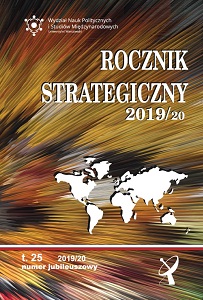
PRZEGLĄD SYTUACJI MIĘDZYNARODOWEJ: ASPEKTY GLOBALNE I REGIONALNE
If it was not for the coronavirus pandemic, 2019 and the beginning of 2020 wouldnot have been regarded in the international politics as overly exciting. One exceptionwas the American-Iranian crisis at the turn of 2019/20. America under Donald Trumpcontinued to waste its leadership capital at both global and transatlantic level. The Weststarted to show signs of its triple division into the US – Western Europe – and Central/Southern Europe, with the latter widening the distance from “old Europe” and shiftingpolitically towards a second class democracy at best. Under Viktor Orbán, Hungarybecame in a way the fi rst private state in contemporary Europe. Transition of power atthe top of EU institutions paralyzed the Union’s foreign activity. Russia, despite its ratherpoor domestic performance, was doing well internationally mainly due to the weakEU and the hectic American policy. China continued its stable course, although itseconomy was slowly losing its previous impetus. Thomas Hobbes’s visions of politicsseemed to settle down in the wider Middle East, where there were many mid- and microlevelconfl icts, clashes and tensions, and no hope for a clear weather. The coronaviruspandemic, which started during the fi rst months of 2020 and will last for a few monthsmore, will bring deep consequences for the global and national economies all overthe world as well as for international politics. However, COVID-19 driven changes needmore time for a credible assessment.
More...